Many people who visit Greece want to learn some basic Greek phrases and words before their vacation. This article includes some useful Greek words, and a few common phrases that Greeks use on a daily basis. Ιncludes a couple of popular rude words, just for fun!
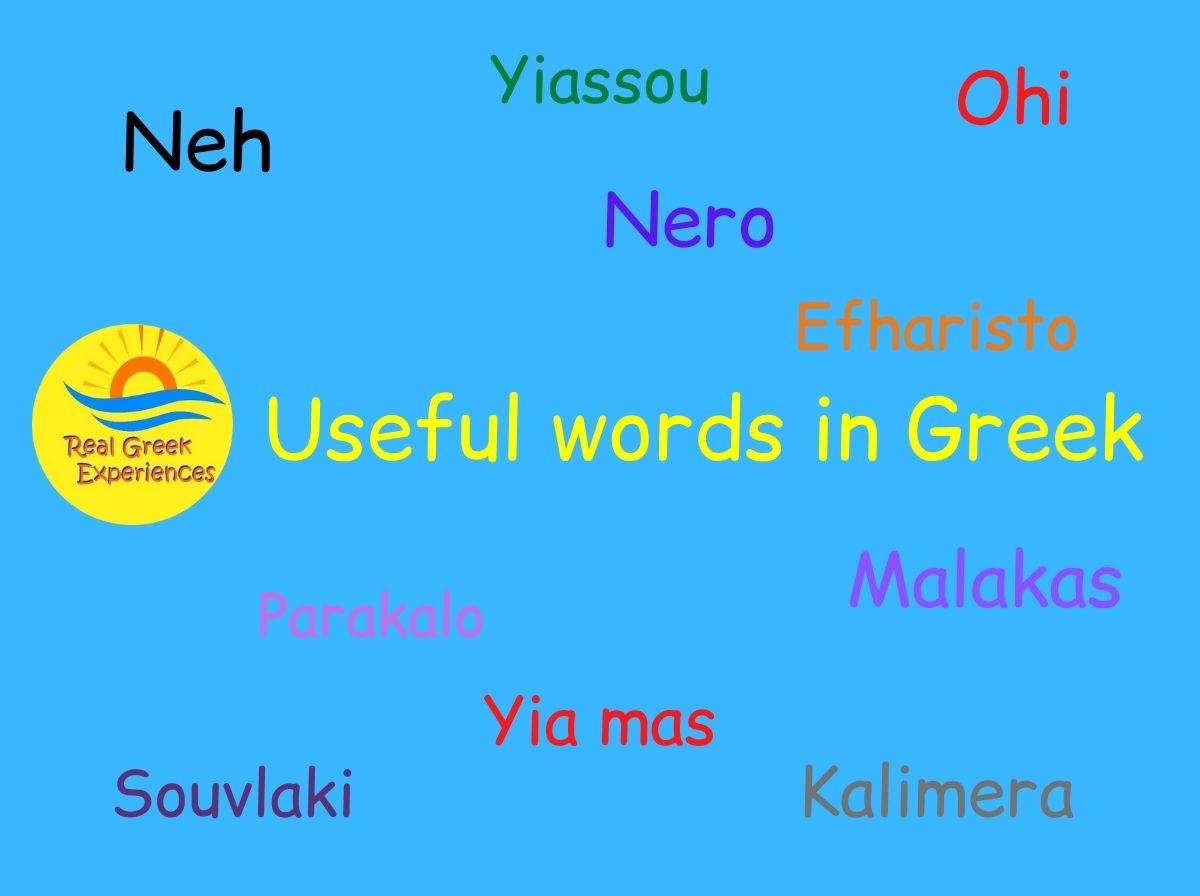
Introduction to the Greek language
The Greek language is quite unique. The alphabet is thousands of years old, and many of the words Greeks use today were also used during the times of Ancient Greece.
Most visitors find the Greek alphabet hard to learn. However, once you’ve managed to memorize the Greek letters, you should be able to read basic Greek words and phrases.
This will be useful when travelling around Greece and the Greek islands, as you will be able to read any road signs that are only in Greek.
No matter how many other Indo-European languages you speak, they won’t help you with the alphabet – the Greek writing system is unique!
At the same time, if all you want to do is to learn a few words and useful Greek phrases, you don’t necessarily need to learn how to read the alphabet. You can be a “good tourist” just by memorizing the sound of a few key phrases.
This guide will introduce you to a few words that you will want to use, and also some phrases that you will probably hear while in Greece. Whether you will want to repeat some of these words, is up to you!
By the way – in case you are interested in a printed guide to learn more Greek words and phrases, check out this Greek phrasebook!
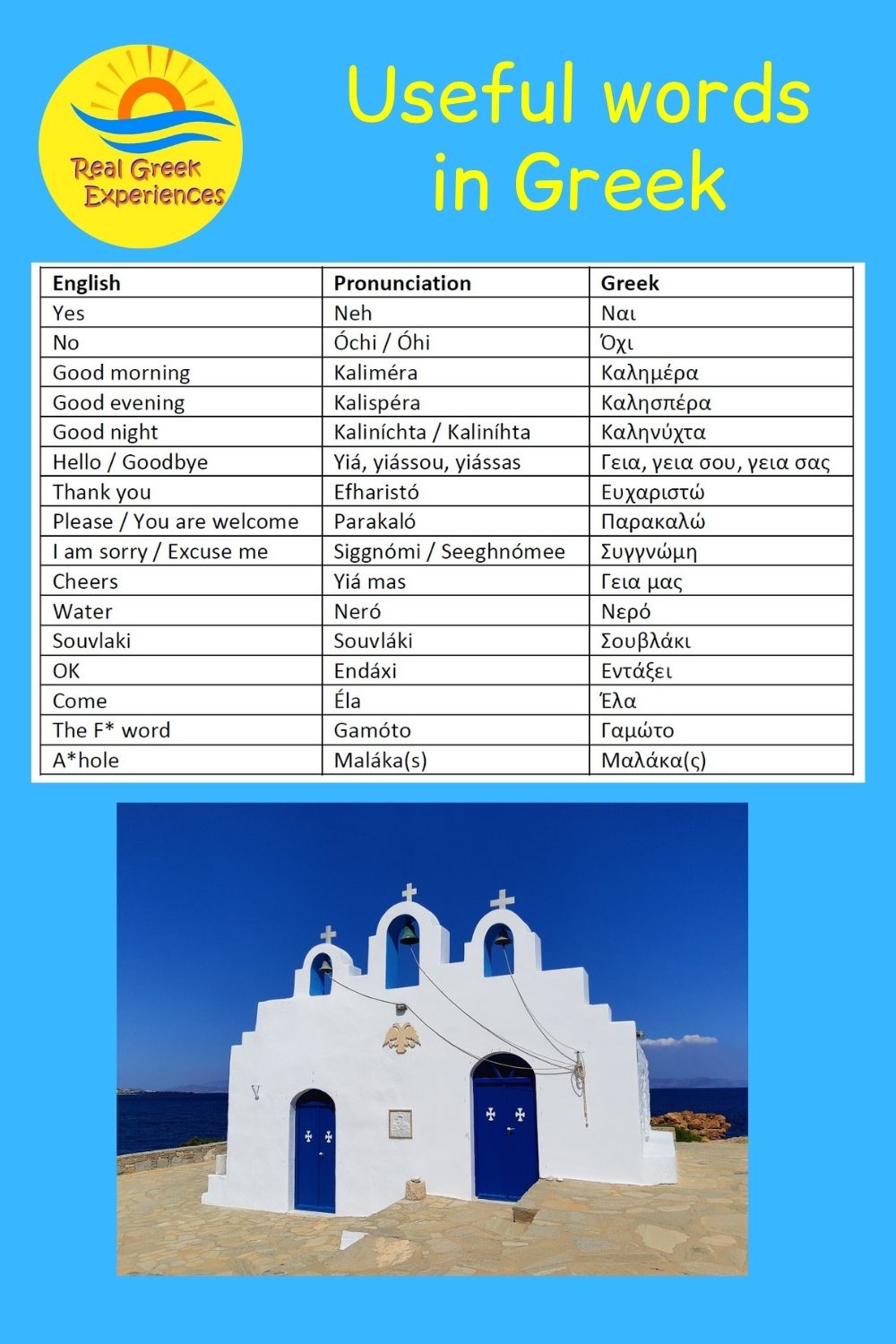
Useful Greek words and their pronunciation – Basic Greek for tourists
According to the prominent Greek linguist Georgios Babiniotis, the Greek language has over 100,000 words, very few of which are used on a daily basis. Here are some of them.
Note: I have used special symbols, so that you can see which syllable you will need to stress. As an example, the word ka-li-mé-ra is stressed on the third syllable: mé.
1. Yes – Neh – Ναι
The Greek word for ‘Yes’ is ‘Neh’. We also use Neh when we answer the phone – though there are many other ways to respond to a phone call.
Note: It is rather confusing that this exact word means ‘No’ in many other languages!
2. No – Óchi – Όχι
‘Óchi’ or ‘Óhi’, the Greek word for ‘No’, is a short word which, nevertheless, many English speakers find difficult to pronounce. You can read it out as ‘oh-hee’, introducing a harsh ‘h’ sound.
And if the word sounds somehow familiar, you are right. Here is my article about the Ochi day, or ‘OXI day’ in uppercase.
Note: When they are among friends, Greek people tend to make a ‘tsk’ sound instead of using ‘ohi’. While it’s not exactly polite, it’s a useful thing to know.
3. Good morning – Kaliméra – Καλημέρα
‘Kalimera’ is one of the most popular words in Greece. It is a composite word, where ‘kali’ means ‘good’, and ‘imera’ means ‘day.
Literally translating to ‘good day’, ‘kaliméra’ is generally used when you see someone for the first time in the day, or until some time in the afternoon. Using it until 1-2 pm is absolutely fine.
4. Good evening – Kalispéra – Καλησπέρα
‘Kalispéra’ translates to ‘good evening’ in Greek. You can use it when you think that it’s too late for ‘kaliméra’, perhaps after 4-5 pm.
Some people will switch to ‘kalispera’ just after midday, which might sound a bit extreme, given that it’s not the evening yet.
5. Good night – Kaliníhta – Καληνύχτα
‘Kaliníchta’ is used when you are wishing someone a good night, i.e. when you won’t see them again on that evening.
It’s useful if you are leaving a taverna where you had an evening meal. If you are staying at a hotel with a receptionist, you can say ‘kaliníhta’ on your way back to your room.
6. Hello / Goodbye – Yiá, yiássou, yiássas – Γεια, γεια σου, γεια σας
If kaliméra, kalispéra and kaliníhta are too confusing, there’s another standard greeting you can use: yiássou, or yiássas. This literally means ‘to your health’, and can be used both as ‘hello’ and ‘goodbye’.
‘Yiássou’, pronounced ‘yah soo’, is used when you are talking to one person. ‘Yiássas’, often written as ‘geia sas’, is appropriate if you are talking to two or more people, but also if you are talking to an older person and want to show some good manners.
Do you want something even easier? You can always just use the short, informal ‘yiá’! This is the easiest of all the Greece greetings.
7. Thank you – Efharistó – Ευχαριστώ
‘Efharistó’ is the first word any polite tourist will want to learn, and it will bring a smile to people’s faces. In fact, I’d say that Greeks don’t use ‘thank you’ as often as other people!
Now, of all the basic Greek words, this is probably the hardest one to pronounce. So, don’t get discouraged if a Greek person tries to correct your pronunciation – they are only trying to help.
Once you feel confident with ‘efharistó’, you can proceed to ‘efharistó polí’ – thank you very much.
8. Please / You are welcome – Parakaló – Παρακαλώ
Unlike ‘efharistó’, the Greek word for ‘you are welcome’ is relatively easy to pronounce: ‘pa-ra-ka-lo’.
We use the exact same word to say ‘please’ – not that you will hear this word all too often here!
9. I am sorry / Excuse me – Siggnómi – Συγγνώμη
The Greek word for ‘I am sorry’ and ‘Excuse me’ is another difficult one. It is pronounced ‘see-ghno-mee’, with a soft ‘g’ sound.
But don’t worry – it’s very common for Greeks to use the English word ‘sorry’ instead.
10. Cheers – Yiá mas – Γεια μας
Let’s say you have ordered some food and drinks at a Greek taverna, and it’s now time to raise your glasses and say ‘cheers’. The word for that is ‘yiámas’, or ‘yiá mas’, which means ‘to our health’.
‘Yia’ is the same word we use in ‘yiá ssou’ or ‘yiá ssas’. Incidentally, it is a shortened form of the word ‘hygeia’, which is related to hygiene, hygienic, and a handful of other Greek words used in English.
11. Water – Neró – Νερό
Given that Greece has very hot summers, ‘water’ might be the single most useful Greek word you will learn.
If you want to buy a bottle of water, try to remember the words ‘mikró’ (small), and ‘megálo’ (big).
Apart from drinking lots of water, here are some more tips to help you stay cool if you are visiting Greece in summer. And remember, watermelon (karpoúzi) is your best friend!
12. Souvlaki – Σουβλάκι
No list of essential Greek words would be complete without at least one iconic Greek dish. Souvlaki is a popular street food option, a quick, inexpensive and filling meal.
Now, there are literally hundreds of Greek dishes, and it will take you several weeks to discover all of them. Here is a guide to 50 popular Greek dishes that you can find in most Greek tavernas.
Note: Depending on where you live in the world, you might find a version of those dishes at a restaurant near you. Quite often, this version might be very different to the actual Greek dish!
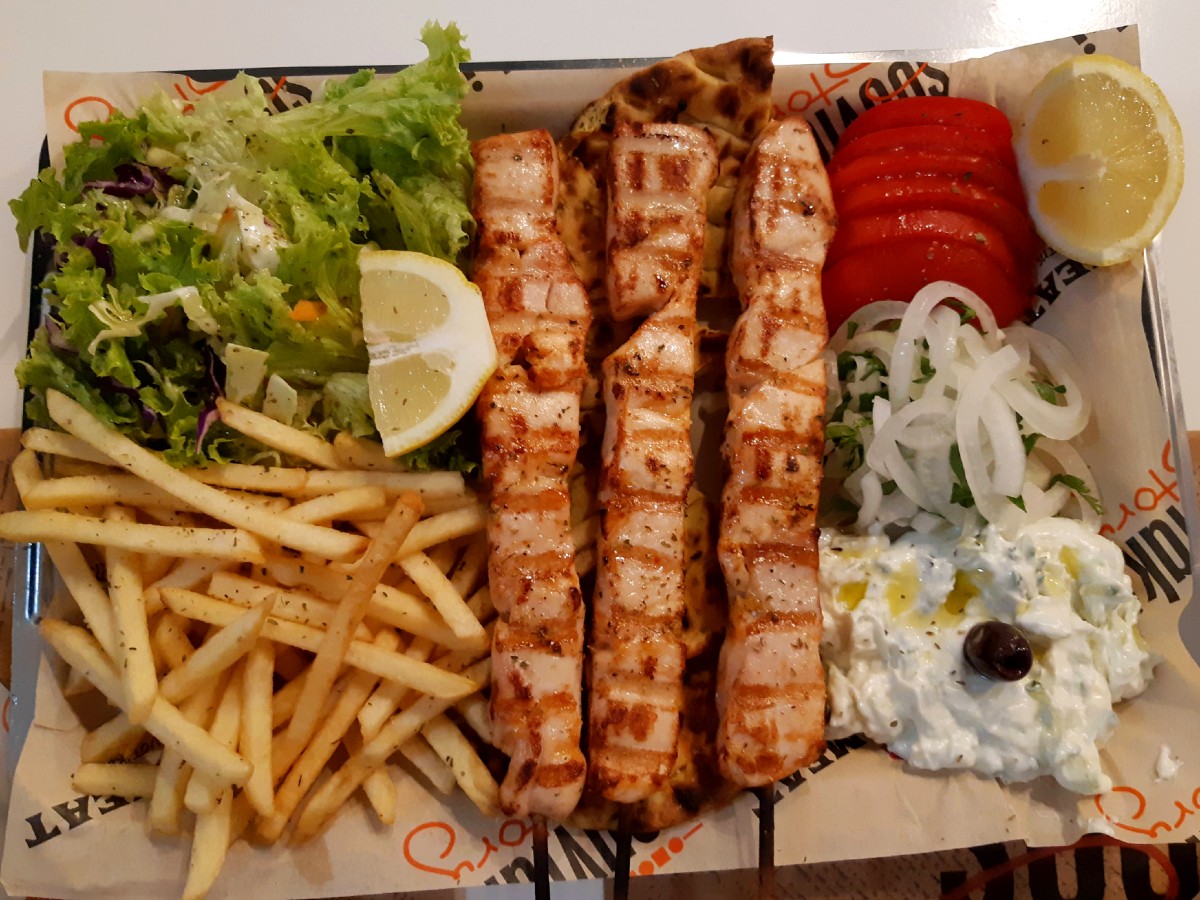
13. OK – Endáxi – Εντάξει
If you spend a few days in Greece, you may think that everyone is always looking for a taxi. In reality, the word that everyone uses is ‘endáxi’, which is often cut down to ‘daxi’.
And what is the ‘daxi’ Greek meaning I hear you ask? Well, it’s Greek for ‘OK’!
While Greeks actually use ‘OK’ a lot, especially in everyday situations, you are bound to hear ‘endáxi’ dozens of times during your Greek vacation. As it’s relatively easy to pronounce, you can try to use it instead of ‘OK’ and impress the Greek people you meet.
14. Come – Éla – Έλα
This is another word you are likely to hear often, especially when someone picks up their phone.
The word ‘éla’ literally means ‘come’, but we also use it as ‘come on’ or even an expression of being surprised. It is often followed by ‘tóra’ (=now), as an indication of being annoyed.
On other occasions, people follow it with a short word, ‘reh’, just for added emphasis. This word doesn’t really translate to anything in English, but it’s not exactly polite, so it’s best to avoid it.
15. Gamóto – Γαμώτο
And now for another common word! ‘Gamóto’, pronounced with a soft ‘g’, is not the word you’d want to say to your grandma, as it’s a popular swear word.
Literally translating to the F-word in English, it is used as an indication of being annoyed, disappointed or just plain angry.
You might choose to avoid using it yourself, but at least now you know what this Japanese-sounding word means.
16. Maláka(s) – Μαλάκα(ς)
The most famous Greek rude word, ‘maláka’ can have several meanings. It depends on who you are talking to, your tone of voice, and any gestures that go along.
As an example, if you are driving and someone cuts you off, the word ‘maláka’ is rude, similar to a-hole. However, you might also call your friend ‘maláka’, in a tender sort of way, like ‘bro’, ‘dude’ or ‘man’.
Now I’ll just point out that the little stress on this word is very important.
So, while the word ‘maláka’ has the stress on the second syllable, the word ‘malaká’, stressed on the last syllable, means soft / softly. If you are planning to use it, make sure you stress the correct syllable 🙂
Curious for more rude words, slang words and Greek curse words? Here you go: Greek swear words. This fun article includes Greek swear words, pronunciation, a tiny bit of history, the exact translation in English, and a few synonyms. I wouldn’t suggest reading it at the office!
A few phrases in Greek – Greek phrases for tourists
And now that you have mastered some of our most popular words, let’s check a few key phrases in Greek.
1. What is your name – Pos se lé-ne
The phrase ‘what’s your name’ is a universal ice-breaker. In Greek, you can choose between two forms of the phrase.
You can use ‘Pos se lé-ne’ when talking to a young person, while ‘Pos sas lé-ne’ is more appropriate if you want to be polite, or if you are addressing a senior.
Literally translating to “how do they call you”, the short phrase “pos se léne” can be a good introductory phrase for a much longer discussion. And if you want to be prepared for some names you haven’t heard before, here’s a guide to Greek names and namedays.
2. How are you – Ti kánis, ti kánete
This popular phrase, that you will hear very often in Greece, also has two forms.
If you are talking to a young person, you will need to use ‘ti kanis’ / ‘ti ka nees’. However, if you are addressing a senior, or more than one people, the correct form is ‘ti kanete’.
The standard answer to this question is ‘kalá’, the Greek word for ‘good’, or ‘ola kalá’, best translated as ‘all well’.
3. I do not understand – Den katalavéno
Even if you have mastered a few phrases in Greek, people may give you an answer you don’t understand. In this case, the best thing to say is ‘Den katalavéno’ – I don’t understand.
4. I would like the bill please – To logariasmó parakaló
Whether you sit at a taverna table for a long meal, or are just ordering two beers, at some point you will need to get the bill.
As you already know the word parakaló, you only need to learn the word for ‘bill’, which is ‘to logariasmó’, with a soft g.
Plot twist: if you want to say the phrase 100% correctly, you would in fact need to say ‘Tha íthela to logariasmó parakaló’, where ‘tha íthela’ means ‘I would like’.
Yet, the last two words are more than enough – even if you only say ‘parakalo’ or ‘logariasmó’, you will definitely get the message across. Please avoid the dated practice of clicking your fingers, which is considered rude.
Once you get the bill, please leave a tip, unless you were really unhappy with the food or the service. Here’s my guide on tipping in Greece.
Incidentally, it’s super easy to say ‘beer’ in Greek pronunciation: beerah! Choose from the most common beer brands like Alpha, Mythos, Vergina, Fix, Kaiser, and the Dutch brands Heineken and Amstel.
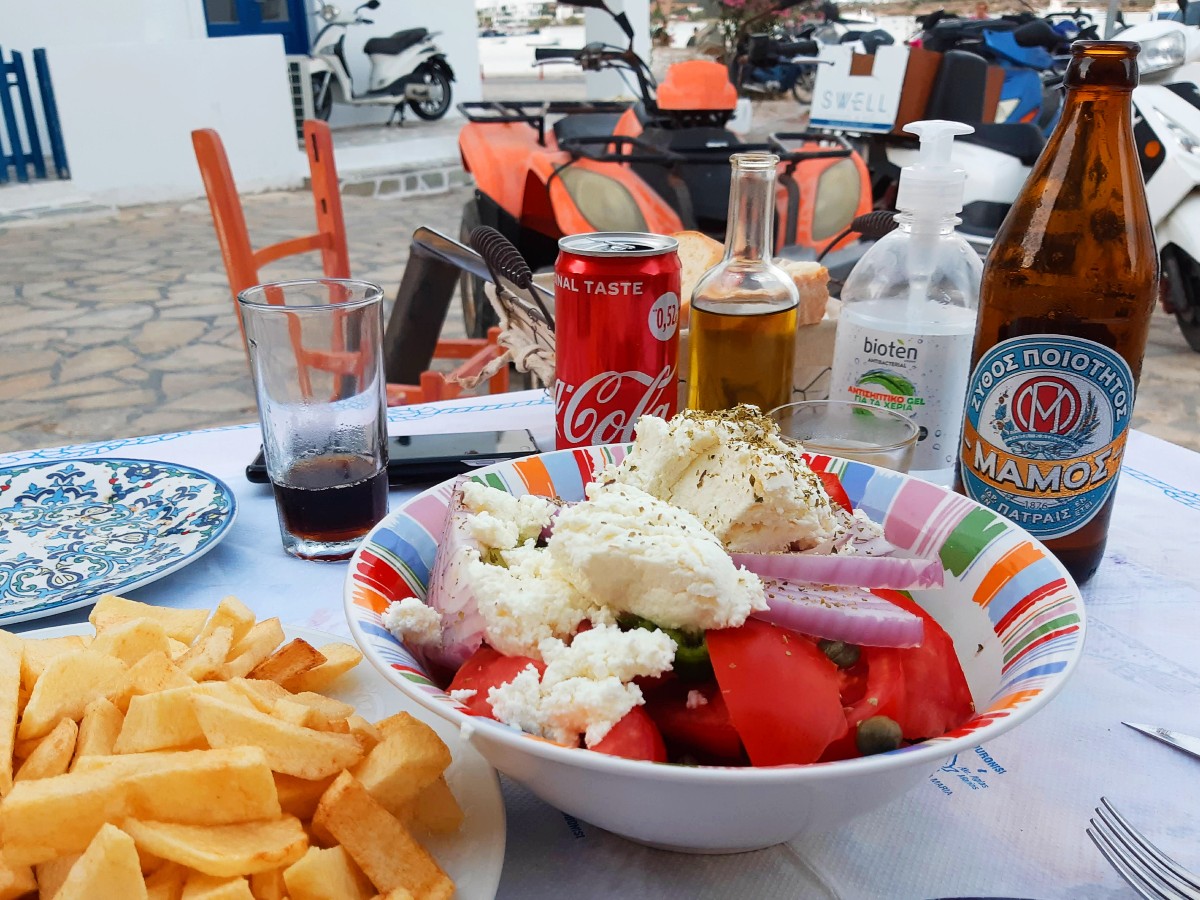
5. Where is the toilet please – Pou ine i tualéta parakaló
Given the absence of public toilets almost everywhere in Greece, it’s always useful to know how to ask for a toilet.
The word ‘tualéta’ indicates a bathroom, washroom, restroom, or however else you may call it in your own language.
The Greek phrase ‘pou einai’, meaning ‘where is?’, can be used for anything you are looking for – the beach, the taxi stand, the best taverna on the island, the Acropolis in Athens.
Tip: Do carry your own toilet paper in case there is none, and DO NOT flush it in the tualéta. Here’s why you shouldn’t flush toilet paper in Greece.
6. How much is this – Póso káni
If you want to buy any products or Greek souvenirs from the shops you visit during your holiday, you can try asking for the price in Greek.
While the actual question is easy to pronounce, you might get stuck if the sales assistant answers back in Greek 🙂
Tip: Be careful not to confuse this phrase with ‘Ti kánis’, which means ‘How are you’!
7. See you / Talk to you later – Ta léme – Τα λέμε
A popular greeting when saying goodbye is the short phrase ‘ta léme’. Literally translating to ‘we say them’ (??), it is the equivalent of ‘see you later’ or ‘talk to you later’. It’s often accompanied by a bye-bye gesture.
FAQs about useful Greek words
Here are some commonly asked questions on Greek for beginners:
What are some cool Greek words?
There are dozens of cool Greek words. A cool phrase that Greeks use when drinking is ‘yia mas’. It literally means ‘to our health’, and is the equivalent of ‘cheers’.
What are some basic Greek words?
Some basic Greek words include neh / yes, ochi / no, efcharisto / thank you, and parakalo / you are welcome.
What is the most popular Greek word?
Words that you will hear very often in Greece include yiassou, the Greek word for hello, endaxi / OK, and ela / come.
What are some rude Greek words?
Two of the most common rude words in Greek are ‘malakas’ and ‘gamoto’.
Is Greek a useful language?
Greek is the official language in Greece (and Cyprus, along with Turkish). If you are planning to live in either of those countries, it is useful to learn Greek. If you are only visiting Greece for a vacation, you won’t need to learn any Greek, as most people speak English. Still, if you want to experience Greece as fully as possible, it’s always helpful to learn a few basic words.
More travel tips about Athens and Greece
I hope you have enjoyed this article with some basic Greek for travelers, and that it will be useful for your next trip to Greece. If you are interested in a book with more Greek words and phrases, check out this Greek phrasebook.
Here are a few more travel guides and tips about Greece and Athens:
- English words with Greek roots
- How to order Greek food in Greece (includes what to say if you have any dietary allergies)
- Coffee and coffee culture in Greece
- What to pack for Greece for all four seasons
- Quotes about Greece

Hi! I am Vanessa from Athens. I love helping people discover more about my native language, which Google Translate isn’t always helpful with. Follow me on my social media:
- Facebook page and very active Facebook group
- Amazon
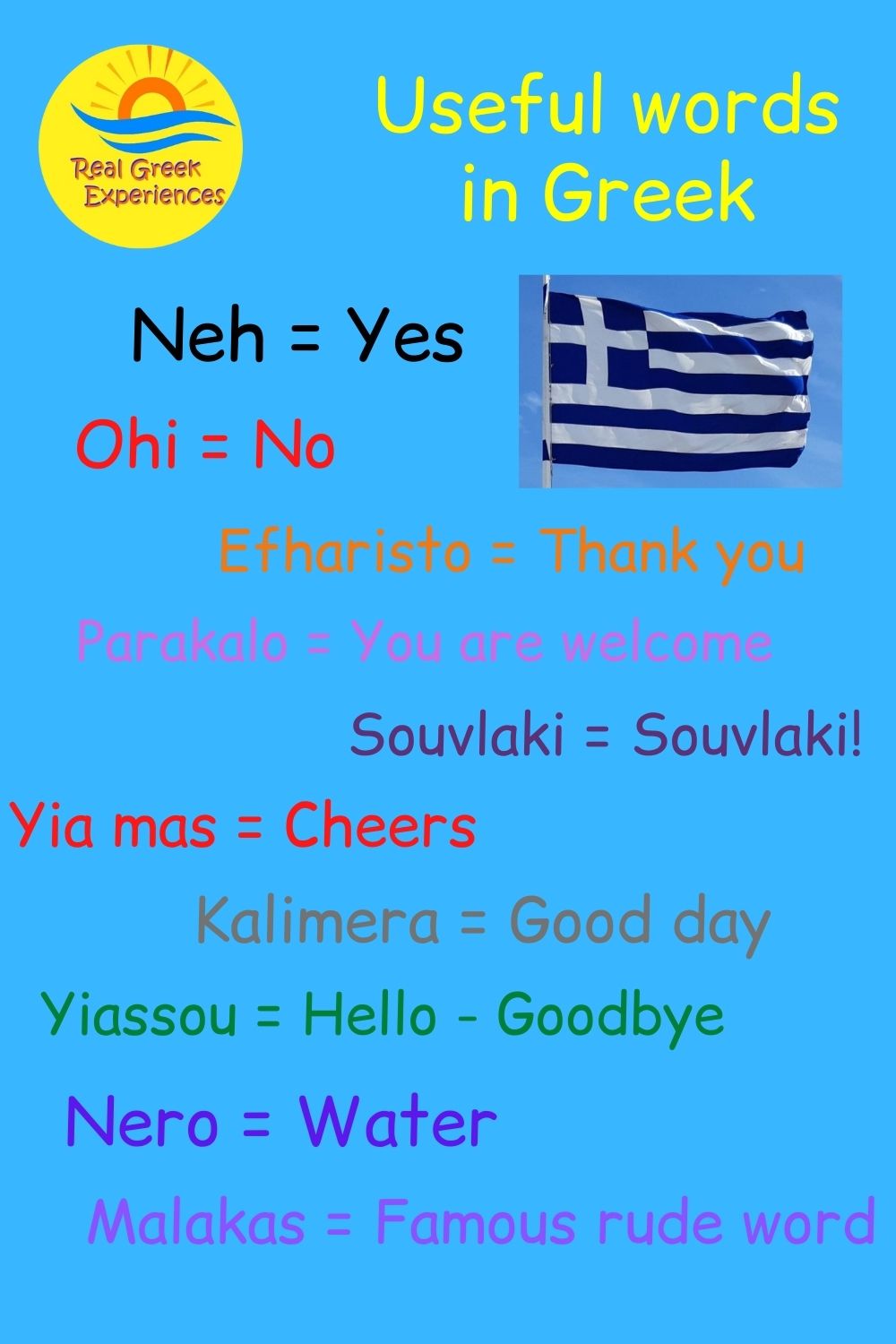

Thank you for your article.
It was useful.
Thank you.
Very useful
A great introduction to the most useful words for a holidaymaker.
Thanks